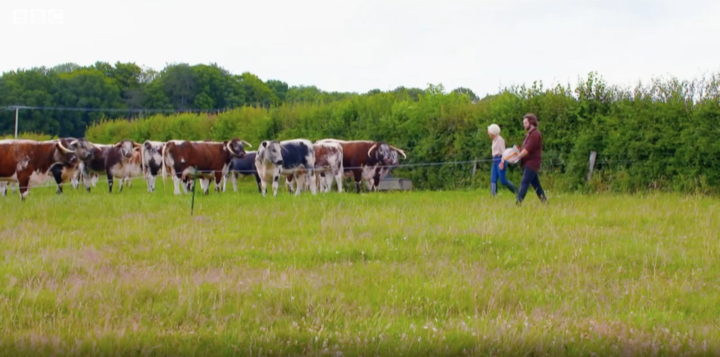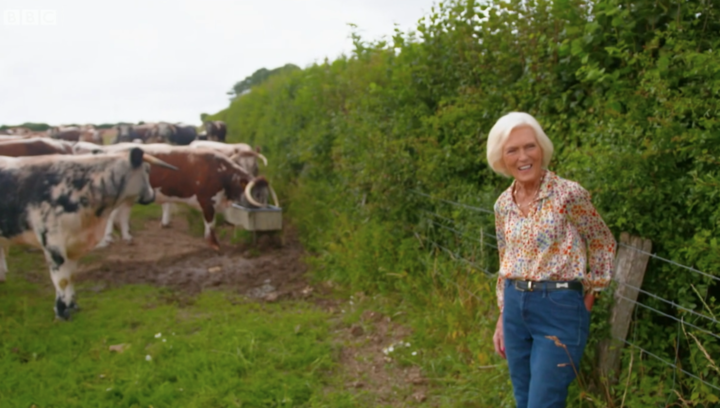Mary Berry enjoys meeting 100% pasture-fed cattle on BBC Countryfile
To start, BBC Countryfile presenter Matt Baker talked to Mary Berry about the high standards of farming and food production in the UK, before Mary set off to meet Silas and his Longhorn cows…
Matt Baker: Throughout Mary’s career, and in more than 70 cookery books she has been a fan of using British meat where-ever she can.
Mary: We have the best farmers, don’t we?
Matt: No doubt about it and we do have some of the highest food standards in the world.
Mary: We certainly do and I think everybody should recognise that. If animals are looked after and loved, fed properly, regularly, not shouted at it makes such a difference. To me it’s very important to what they’re fed on and how they are looked after.
Matt: And English Farm is shining example of that – it’s an organic beef farm rearing their 80-strong herd of Longhorn cattle using the most natural methods possible. Silas Headly-Lawrence looks after his herd single-handedly – apart from today
Mary: When I’m going to be helping out…
They’re so calm and quiet and they have never seen me before and they’re taking absolutely no notice.
Silas: Definitely – that’s part of the nature of the breed. But also that’s how we manage them, we don’t come in and make noise – I call them and they follow me.
Mary: This is one of only 100 certified farms in the country where the animals are 100% pasture-fed.
Silas: At no point in their life are they fed grain or concentrated feed or anything that essentially doesn’t grow in a natural state in our pasture. It’s all about maximum diversity – legumes like red and white clover, bird’s foot trefoil and herbs like plantains. Some have lovely deep tap roots that help break up the soil structure and draw nutrients up, others might be more mineral dense, or some might be anthelmintics like chicory – anthelmintics essentially means it helps flush out internal parasites in the animals like gut worm.
Mary: The cows all seem very happy with their five-star menu as does their very impressive male. This is your bull over there.
Silas: He is Otis and he is getting interested in someone!
Mary: He’s big isn’t he! As essential part of Silas’ system is moving the cows daily to fresh pasture.
Silas: You can move them every day a bit like on a chess board and by the time they exit at the end, the first section they grazed could have had a 20-day recovery period that allows you to graze outside 365 days a year instead of bringing them in and housing them in a barn.
Mary: They are never indoors and they never have grain.
Silas: Precisely.
Mary: Calves are kept with their mums not separated from them like in most commercial herds, to give them the most natural, stress-free life possible.
Silas: So this is Queen my favourite cow – that’s actually her daughter from two years ago in the background. She has the lovely bonnet shape to her horn which is the textbook look for a Longhorn. It’s all socially structured – yesterday I had a grandma with her daughter and the daughter had her calf there and her calf from last year – and there are also some that are not so friendly with each other and then there are the loners.
Mary: It is true family! Time to dust off my young farmer’s skills and get these cows a fresh meal. The grass is greener the cows say.
Silas: Yes, the grass is always greener on the other side of the fence.
Mary: They know what’s happening – there is a lot of anticipation.
Mary and Silas move the fence…

Silas: Give them a call. Pick up the fence and reel it back. Come on. Come on.
Mary: Come on then.
Silas: They definitely responded. They will all walk through.
Mary: They are silent and very contented. They are enjoying the new grazing.
Silas: They have come in and bee-lined straight to the best part of the pasture.
Mary: Why don’t more farmers use your system?
Silas: Some of it comes down to the land you have, it might be too wet in the winter to have them out all year. But you don’t have them outside all year – you can put them in for some parts of the year but not feed them the grains – just put that energy and time into producing lots of forage so you can extend your grazing season.
Mary: But of course many farmers don’t have the perfect grazing that you’ve got or built up.
Silas: You can really regenerate degraded soils and degraded pastures all through good management. You can really turn around the productivity and diversity in your pasture.

Mary: I think they are very lucky here.
Silas: I hope so!
To end the programme Matt barbecued two feather-blade steaks from English Farm for Mary and him to eat! Both loved the taste and Mary remarked that this British steak had a real depth of flavour.



